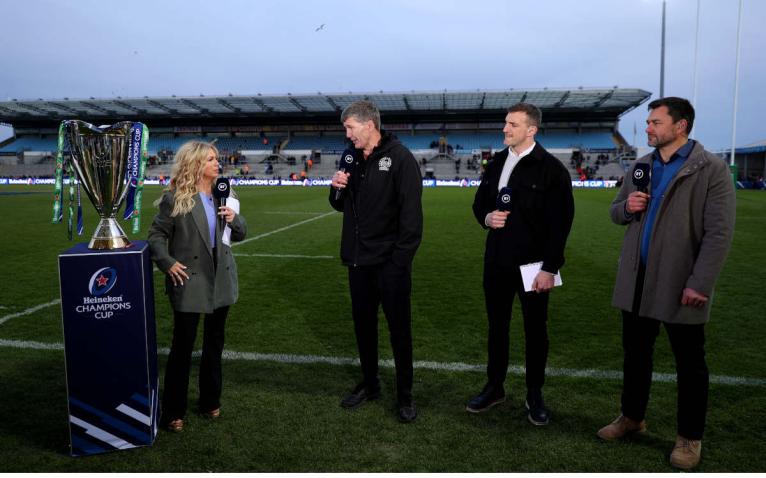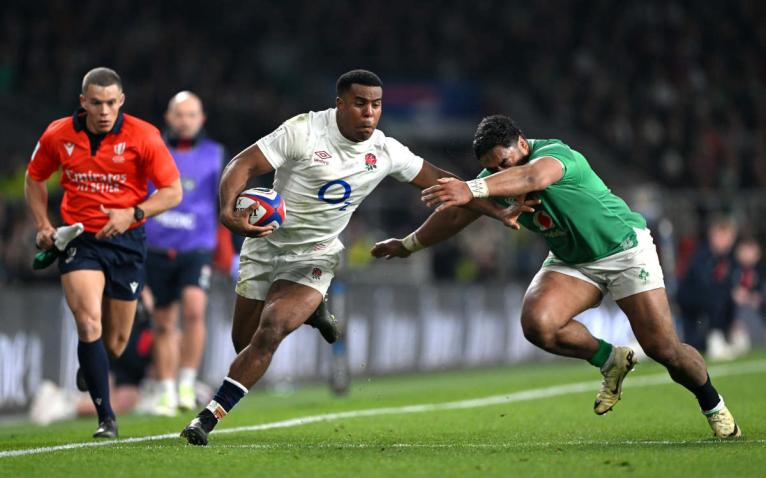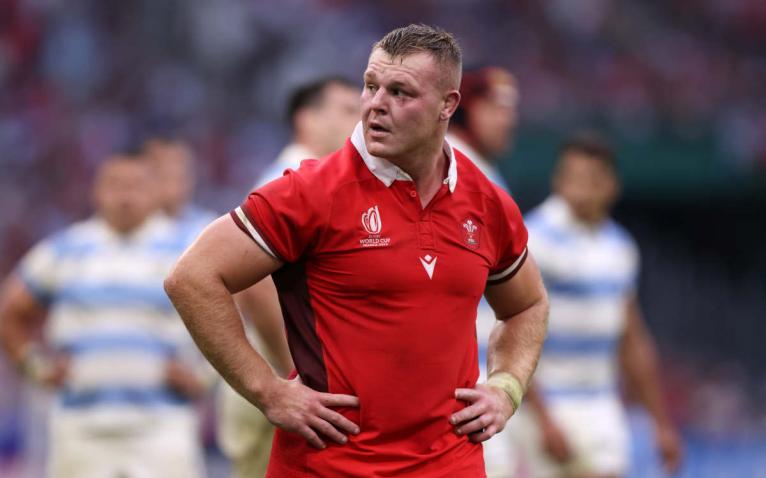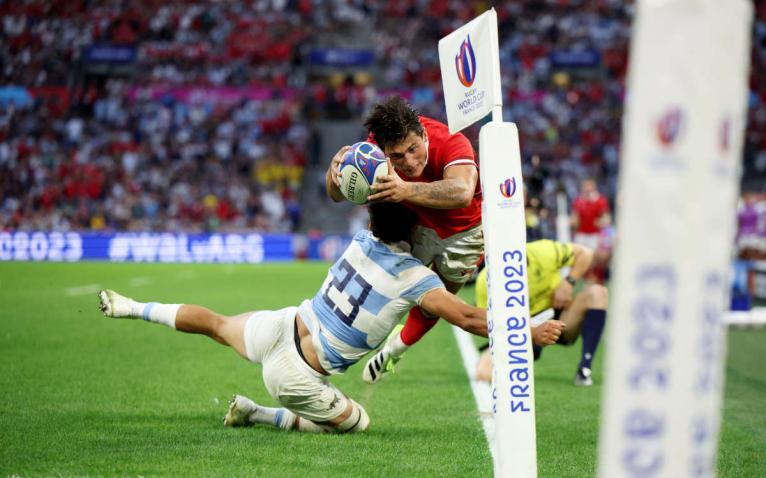It is coming up to seven years since Sam Warburton last laced up his boots in anger. On that fraught, chaotic evening in Auckland, where he had used his celebrated powers of diplomacy to talk down referee Romain Poite from awarding the All Blacks what could have been a series-winning penalty, the famed back-row played like a colossus, before uniquely sharing honours with Kieran Read.
As he gave interviews to the assembled media minutes afterwards, few thought they would never see the double Lions captain and Welsh Grand Slam skipper take to the field again.
Exactly 12 months later, he quit, saying his body could no longer perform at the level he expected it to.
As we now know, Warburton has since forged a successful media career. A pundit on TNT Sports and the BBC, with a newspaper column in The Times, he is sought for his sagacious counsel, but back then had this most driven of players meticulously mapped-out his post-career pathway?
A smile, and a chuckle breaks on Warburton’s hitherto earnest face. “To be honest, I had no idea where my career would go when I retired. I always respected the media and was interested how it worked but nothing was written in stone. A couple of handshakes, or gentleman’s agreements if you like, were made with people who said, ‘when you’ve finished, we’d love you to come on television’, but you could call it a pretty flimsy exit route!”

Those who know Warburton well are unsurprised he’s excelling in his post-playing career.
This writer first interviewed a young, aspiring flanker at Glamorgan Wanderers shortly before his A-Level results dropped (all As, since you ask), which gave an indication of his application to hard work and not taking short cuts. That preparation has aided his commentary. It is clear and layered with insight and honesty. What is obvious is that he doesn’t skimp on doing his homework.
“What I didn’t know back then was how much I’d enjoy it. So many people try to overcomplicate the game, whereas I really like breaking it down and explaining its simplicity. I listen to Gary Neville on comms during football games and he tries to tell the audience something they didn’t know. I like that approach. I really want people to try and understand the game of rugby, whether it’s a youth coach, an aspiring young player or a fan of 40 years. If they hear me explain something and say ‘oh, so that’s why they do that?’, then it makes watching the game more enjoyable.”
Taking short cuts is not in Warburton’s DNA. Putting in the requisite hours has always been fundamental to anything he’s applied himself to. “I’ve always done my homework otherwise I’m afraid I’ll get found out. I was very diligent as a player, a bit obsessive really, and a bunch of players were like me; Leigh Halfpenny, George North and Alun Wyn Jones to name but a few. I’m not naming names, but there are some who will just rock up to a TV studio unprepared. If I’m allocated a game, I will siphon off a significant amount of time to prep for the game to make sure I’m doing it justice.” His diligence has paid dividends as he’s now one of the most respected voices in the sport.
With the media stuff, I thought I’d just run with it for two or three years and see what’s next, but I’m still here, six years later.
A phone call, out of the blue, three years ago told him he was on the right path. “I remember vividly getting the Lions gig in 2021. I was on my own, walking the dog when I was asked to commentate on the European Cup final. I pumped my fist a bit because I had no-one to share the moment with, but I was chuffed because I’d done my dues, revising, watching other analysts and doing all my due diligence. It’s about the small wins. It was the same with the World Cup final back in November. I had a little bit of imposter syndrome, like I had as a young captain, but then you think, ‘no, it’s been five-six years of applying myself’. I prepare meticulously to make sure I can back up what I’m saying with data. I guess it’s all those skills picked up in rugby have been transferred into the real world.”
With a position on the board at Cardiff Rugby Club and his burgeoning S&C empire, the SW7 Academy, Warburton wouldn’t exactly be twiddling his thumbs if his face no longer fitted, but front-of-house punditry duties appear to suit him. “With the media stuff, I thought I’d just run with it for two or three years and see what’s next, but I’m still here, six years later. When I’ve been out of the game 10 years, I’ll think I’ve been out of the game too long, but anything more will be a bonus.”

If he has any advice to players just about to hang up their boots for the last time, with Ellis Jenkins, Jake Polledri, Ken Owens, WP Nel and Alex Lewington recently announcing their retirements from the game, it is to follow your heart. “Follow something you really care about because you’ll put way more energy in. I’ve just fallen into things I’m passionate about. Yes, I retired, but I didn’t leave the game, I’m still as involved as ever, just not lacing my boots up week-in, week-out.”
Away from his media demands, Warburton is a high-performance disciple and his SW7 mantra is ‘We Build Athletes’. A keen observer at the recent Rosslyn Park 7s, where the might of the English school system shows its wares, his beloved Wales is never far from his thoughts, especially with a glut of talented Welsh youngsters honing their skills over the Bridge, following the likes of Louis Rees-Zammit, Tommy Reffell and Dafydd Jenkins. With the Welsh Rugby Union locked in a review they hope will catapult them out of their torpor, Warburton has thought deeply about Wales’ limited resources and how to make the most of them.
“Firstly, we can’t recreate the likes of Millfield, Oakham or Sedbergh [public schools] in the English system. They’ve had that elite pathway for decades – Gareth Edwards went to Millfield in the late Sixties. We were in touch with Millfield with the SW7 academy and they have four S&C coaches. We simply don’t have the same economy as England to justify hundreds of kids paying those fees or going on those scholarships. However, what we can do at the regions is create a handful of well-funded hubs that need to be licenced to the WRU, so any young player who shows any real talent has to be in one of those satellite schools so they’re on the radar. You want 300-400 players. Wales should make their modest geography an asset. We also need to build fantastic relationships with the universities, which fell down because Cardiff University didn’t accept Manny Feyi-Waboso. If you have certain unique athletes like that you need to have some dispensation, or better intelligence so they don’t slip over the border.”
You see these accounts all the time that say, ‘get in shape quick’, ‘take short cuts’. Believe me, it doesn’t happen. The wrong messaging is going out. You simply have to put the work in.
Where Wales, and other countries have erred, is the development pathways between the ages of 14-19. Warburton says it is no disrespect to the current individuals in-role but more experienced operators are needed. “The S&C coaches and skills coaches in schools are often guys starting off in their first or second roles, beginning their journey. I tell kids, ‘it’s not how good you are when you’re 15 that’s important, it’s how good you are at 20’. You need to have the right people in place and to have the right touch-points for those four or five years so you’re not learning from novices. Individuals should be well remunerated, experienced specialists with top-notch facilities to work from.”
Without wanting to sound too evangelical, or like Cardiff’s answer to Joe Wicks, Warburton is concerned about the level of fitness of today’s youth, and the quick fixes espoused by social media. “You see these accounts all the time that say, ‘get in shape quick’, ‘take short cuts’. Believe me, it doesn’t happen. The wrong messaging is going out. You simply have to put the work in. It always surprises me how few people are prepared to put in the graft to get to the top. No-one in business or sport has reached the pinnacle in six months. Without sounding arrogant, we know what works. On our app, we have a free ‘youth development plan’. You can train as long as you want, without having to spend. We want to give back a bit and help youngsters on their S&C journey, to teach them the fundamentals. They should have access to good quality training without having to put their hands in their pocket. I’ve been living that training and nutrition lifestyle for 20 years now, since I started with Cardiff. It’s part of who I am.”

When he’s not in Rhiwbina with his young family, or in the gym, during the season he’s racking up the car and air miles covering games, routinely bumping into old adversaries, and it’s reassuring to hear the old competitive fires haven’t yet dimmed. “I regularly get asked for supplement and nutrition tips and asked to bring my gym kit along to games. A lot of the guys who work in the media still train. People like Ugo [Monye] and Brian O’Driscoll are still in shape. Kieran Read is into his fitness work and I know Richie McCaw is into ultra-endurance. It’s the minority who let themselves go. Post-rugby, it’s good mentally to keep some sort of routine. The fear when you retire is you start some sort of decline. We do over 30s and 40s plans because you can still be strong in your middle age, you just have to be smart in how you train. I should know because my body is knackered so I train differently to how I used to.”
When it comes to young players who have the characteristics to make it at the very highest level, Warburton says there needs to be a dose of realism, and acceptance that playing Test rugby is simply not for everyone.
Christ’s tall and explosive. You don’t look like that floating round the gym once-a-week for four years. He’s put the work in for three-four years and now he’s a machine.
“People don’t like me saying this but to play international rugby you have to be a certain level of athlete – it’s a different sport. I won’t name names but there are certain players who will excel at club level who get bigged up by the media who say, ‘get them in the Test side’, but I think, ‘no he won’t’. If you’re not physically extremely powerful, fit or have a superpower in another aspect of your game, you won’t make it. It’s as simple as that. Some might argue Justin Tipuric wasn’t huge but I can tell you he was a lot stronger than you thought he was and he was insanely fit and highly-skilled. He was incredible.”
One player Warburton saw from a young age who had all the tools required to succeed was Dewi Lake. “I saw him first at U20 level when I was with the Wales age-grade system. One, I saw the level of athleticism that is very rare. A genetic ability to create power that not many people have. Two, he was extremely diligent and professional about how he approached his nutrition, analysis and preparation. And thirdly, and arguably most importantly, it was his mental toughness and determination that stood out. I thought, he has those three traits, he’s going to make it. Some have one or two of those facets and sometimes that’s not quite enough but Dewi had it, and a few years later he’s named joint Wales captain for a World Cup.”
Another player who embodies what Warburton looks for, and is why he’s an SW7 ambassador, is Christ Tshiunza. “Yes, he’s a Whitchurch boy, like me, but I’ve seen the professional application he’s put in. You don’t look like Christ by accident. The central African genetics are crazy good. Christ’s tall and explosive. You don’t look like that floating round the gym once-a-week for four years. He’s put the work in for three-four years and now he’s a machine. We should be rewarding and endorsing that drive, mindset and work ethic. It isn’t employed by enough young people. Christ is only in the foothills of what he can achieve. He has another decade of progress.”

Listening to Warburton speak, it’s clear he’s not buying into a general malaise around rugby in England and Wales, pointing out that it’s not gloomy everywhere with France, Ireland and Japan in rude health, so, are we, as a sport, too hard on ourselves? “I think so. Rugby is in a good place. I remember after the 2021 Lions tour people were panicking. That was probably the worst tour from an entertainment perspective I’d ever seen. Two teams playing negative, risk-averse rugby. It was terrible timing coupled with no crowds. If you look at rugby now, in the Six Nations, there were more tries than ever. The Premiership has had a ridiculous standard of running rugby as well as the Champions Cup, where I covered the Bordeaux v Harlequins game. People being doomsayers aren’t going to grounds. They are sold out when I work at them. Yes, clubs have gone into administration but that’s about how they’ve been run.”
Warburton also feels rugby is under scrutiny for its player welfare but that immense strides have been made. “Another thing I’ll say is, rugby is the most pro-active and probably one of the safest contact sports in the world due to its head-injury protocols. If boxing had the same protocols as rugby, bouts wouldn’t go past one round. If you get a concussion in rugby, you’re not playing for 12 days, but in boxing, you’re getting hit 12 seconds later after a knockdown. It’s hugely dangerous but doesn’t get the same uproar. The press jump on it because of the size and middle-class demographic. It’s a bit of scaremongering.”
Louis [Rees-Zammit] epitomises what speed and power are. If we wanted to work with one guy, it had to be him. He’s putting rugby on the map. Not many would take the risk he has, or have his mindset, he’s a trailblazer who has backed himself.
One Cardiff boy who hasn’t let rugby sap his global ambition is Louis Rees-Zammit, who has headed Stateside on a quest to make it in the NFL with the Super Bowl champs, Kansas City Chiefs. Rather than seeing it as a failure of rugby to keep him, Warburton sees it as an opportunity to spread the word about the sort of athletes rugby produces. “Funnily enough, we are doing an S&C plan with Louis. He epitomises what speed and power are. If we wanted to work with one guy, it had to be him. He’s putting rugby on the map. Not many would take the risk he has, or have his mindset, he’s a trailblazer who has backed himself. I don’t think there is going to be an exodus at all. There are hundreds of thousands of athletes in the US who want to be an NFL player every year but the precious few make it. His profile could even lead to more wanting to play rugby out there. Louis is at one end of the continuum of the most extremely gifted athletes you’ll ever come across.”

Along with NFL-wannabes, Warburton is also hoping he can lift several Sevens sides to reach the Olympic Games, with Kenya, Madagascar and Uganda competing in the Challenger Series, and one place up for grabs for Paris. Again, the local connection saw SW7 taking on its next challenge. “Phil Davies was my coach at Cardiff Rugby and is now Director of Participation at World Rugby. We’d regularly share information about law changes. I’d pick his brain and he’d pick mine and we got speaking about S&C. He was saying, there are some up and coming nations who don’t have any S&C support on the Sevens Series, and I thought, ‘we can do that for you’. I’ll be honest, it’s one of the most satisfying things I’ve done to cover not just the Sevens, but the 15-a-side game and women’s game, to elevate their performance. I’m grateful to have been given the opportunity to do it. Phil was one of my favourite coaches because of the way he treated his players and his communication was one of the best of any I came across. I never thought it would take me to this avenue where I’m helping players from all over the world, but I’m flattered and loving it.”
Catch him if you can, but Warburton has applied his prodigious work ethic to professional life and is taking no prisoners.


On the title, i wonder for many of those people it is a case something like a belief in working smarter, not harder?